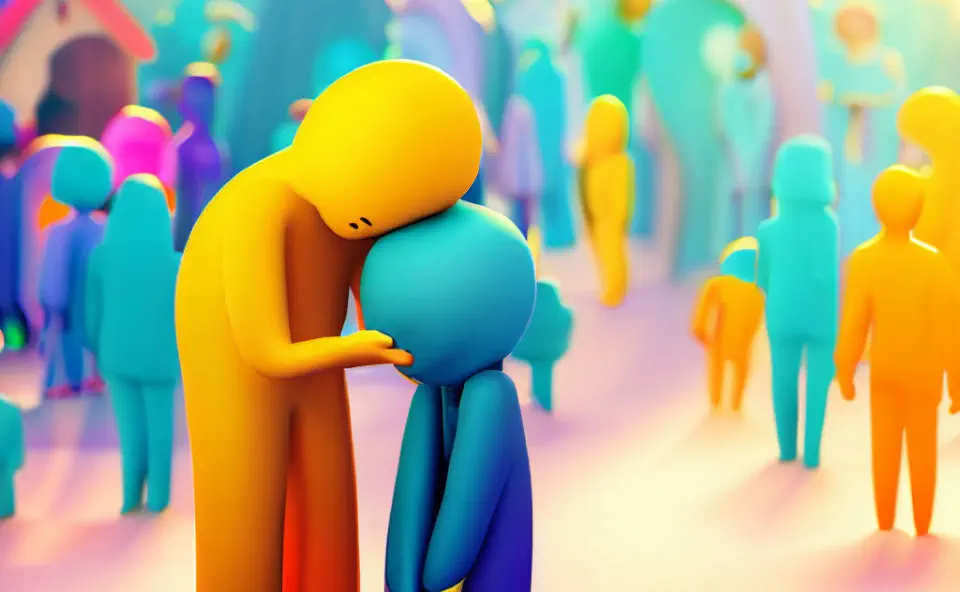Stormy weather out there. Troubled times, right? Highly sensitive people (HSP) are
particularly affected by this - usually in a highly unpleasant way. For they are intensely
aware of the state of the interpersonal ‘fabric‘ - whether consciously or unconsciously.
Quite a few feel constant tension without really being able to locate its source.
Anger, frustration and fear are also spreading everywhere. There are invitations from all
sides to join the symphony concert of indignation and outrage, hostility and patronising
and add one‘s voice to the choir on one side or the other.
It seems the easier way to simply do as the others do, as if one could not survive well
outside the beaten track. And yet, to some, it doesn't feel right to go along.
Escapism seems to be another tempting answer for the highly sensitive: The dream of
the "cabin in the woods", digital distractions, retreating into an ever-shrinking private
sphere, victimised attitudes, alcohol and other substances, right up to the extreme of
self-annihilation.
But the feeling of powerlessness is only created by giving in to it. You see your
own powerlessness as the cause of your own withdrawal? But in reality, it's the other
way round. There are other ways.
‘Surviving‘ difficult times as a highly sensitive person
Should you go into confrontation? But how do you then endure the confrontation- triggered negative sensations if you are highly sensitive and unpleasant sensations often linger in your body for hours, days, weeks and don't want to go away? It would probably be childish magic thinking that highly sensitive people could create a better world from scratch. You won't be able to just ‘will‘ it into reality by meditation either, as earthly challenges require earthly solutions. Beyond any wishful thinking, a very realistic mission awaits the highly sensitive today: damage control - help ensure that bad things do not get worse. • The challenge: Waves of anger, fear, frustration, instruction, contempt, indignation, selfishness and self-righteousness flow through society and behave a bit like a virus, trying to spread from one person to another through social contagion. The mission: to decide to be one of the people who do not pass on the virus. Many highly sensitive people have a sense of what harms the inter-human fabric, the larger web of relationships, and what is healing for them instead. They can make the decision to only pass on what is good for others and to be the end of the line for whatever is harmful. Being angered or fearful or indignant about something and not passing it on to others is a sign of conscious awareness. • The challenge: People feel threatened by the general mood, depressed, frightened, fall into rigidity and withdrawal, or frustration and anger. The mission: To support these people to focus instead on what is nourishing or even harmonious and beautiful in their lives and to gradually return to personal sovereignty. We nourish everything we give our attention to and weaken everything we take our attention away from. We are all world gardeners, and our attention is the watering can. We can let others grab our attention from us, or we can take responsibility for directing it ourselves, sensibly and with discernment, reclaiming personal sovereignty over our focus. (By the way, meditation and mindfulness practices can help develop a better focus awareness.) • The challenge: we all have our so-called "triggers", and today's world plays piano on them. We usually realise too late that a trigger has once again put us on autopilot and engulfed us into just another escalation. Later on, we return to our senses and see the shambles created as a result. The mission: Recognise the injuries behind the triggers. Behind every trigger lies a wounded part of our personality. The more we recognise these parts and take care of them and heal the old wounds, the more our fragmented personality becomes whole again. More inner peace becomes possible. Less projections on others are necessary. And where there is peace and wholeness, discord can no longer gain a foothold. Moreover, inner peace is not just a state: it has also an effect that can be contagious. (You certainly know someone who enters a room and the room immediately calms down by a notch or two. Why not become that someone yourself?) • The challenge: the noisy people who are looking for the centre of the stage have no problem seeing each other: They just have to follow each other's noise to connect. This allows them to dominate the communication space. The quiet ones, the thoughtful ones, the doubters, the humble ones, the withdrawn people have a much harder time networking. They may even think they are alone with their interrogations and doubts and issues and that there is no one out there who would connect with them. The mission: find other ways to network. For example, if you know people who are slowly slipping into withdrawal or loneliness, catch them and bring them together with others they may relate to. Or look for discussion groups, self-help organisations or platforms in your region or on the internet. And if you can't find any, why not set up such opportunities yourself? And if the hurdles seem insurmountable at first (which they usually are not), seek help from therapists or coaches to put things into perspective and relativise them. When you finally look your own fears in the eye, you realise that they are much smaller than you thought. And when you know you have a supportive human network you can turn to for help or just for talking, it's easier to take risks, like the risk of actually living and going forward on your very own path. • The challenge: In turbulent times, the temptation of being self-preoccupied is intense. Digital media are a constant invitation to become self-obsessed. Language has been invaded with „I / me / my“-sentences. However, self-centredness is a pretty sure-fire way towards an unhappy life. That may be a little counter-intuitive. But Matthieu Ricard, a French Buddhist monk who is part of the Dalai Lama‘s entourage, writes: "All those who are unhappy are unhappy because they have sought their own happiness. All those who are happy are happy because they have sought the happiness of others." The mission: Focus on making other people around you feel better and happier. If they are also focussed on making you feel better, then they are the right people, because there is reciprocity. Highly sensitive people in particular often find fulfilment in serving others, even and especially in tense times. And turning one‘s attention to others increases curiosity, and without curiosity there can be no creativity. How could there be a creation of something new where there is not this impulse towards novelty called ‘curiosity‘? Sometimes there are difficult times. That is the way it is. Anyone with an interest in the history of humankind knows that there can be times when something obviously has to run riot inexorably before things finds peace again, because humans have this built-in flaw of learning best when they hit a wall. Accepting this is not fatalism, but an invitation to look forward and prepare for a better future right now. For now, it is the time for damage control - so that there won't be so much to repair once the storm has passed. It could even be that more people realise that the highly sensitive have quite a few good solutions for a better future. See also: • How to try to heal the world • More blog articles • Coaching for HSP - and what High Sensitivity is • Coaching for the highly gifted • Contact info: Ask your questions or make an appointment • More on Blog & Articles
Phone +49 160 9623 2547

Alexander Hohmann - Blog
Coaching and More

E-Mail:
Stormy weather out there. Troubled times, right?
Highly sensitive people (HSP) are particularly
affected by this - usually in a highly unpleasant
way. For they are intensely aware of the state of
the interpersonal ‘fabric‘ - whether consciously
or unconsciously. Quite a few feel constant
tension without really being able to locate its
source.
Anger, frustration and fear are also spreading
everywhere. There are invitations from all sides
to join the symphony concert of indignation and
outrage, hostility and patronising and add one‘s
voice to the choir on one side or the other.
It seems the easier way to simply do as the
others do, as if one could not survive well
outside the beaten track. And yet, to some, it
doesn't feel right to go along.
Escapism seems to be another tempting answer
for the highly sensitive: The dream of the "cabin
in the woods", digital distractions, retreating into
an ever-shrinking private sphere, victimised
attitudes, alcohol and other substances, right up
to the extreme of self-annihilation.
But the feeling of powerlessness is only
created by giving in to it. You see your own
powerlessness as the cause of your own
withdrawal? But in reality, it's the other way
round. There are other ways.
‘Surviving‘ difficult times as a
highly sensitive person
Should you go into confrontation? But how do you then endure the confrontation-triggered negative sensations if you are highly sensitive and unpleasant sensations often linger in your body for hours, days, weeks and don't want to go away? It would probably be childish magic thinking that highly sensitive people could create a better world from scratch. You won't be able to just ‘will‘ it into reality by meditation either, as earthly challenges require earthly solutions. Beyond any wishful thinking, a very realistic mission awaits the highly sensitive today: damage control - help ensure that bad things do not get worse. • The challenge: Waves of anger, fear, frustration, instruction, contempt, indignation, selfishness and self-righteousness flow through society and behave a bit like a virus, trying to spread from one person to another through social contagion. The mission: to decide to be one of the people who do not pass on the virus. Many highly sensitive people have a sense of what harms the inter- human fabric, the larger web of relationships, and what is healing for them instead. They can make the decision to only pass on what is good for others and to be the end of the line for whatever is harmful. Being angered or fearful or indignant about something and not passing it on to others is a sign of conscious awareness. • The challenge: People feel threatened by the general mood, depressed, frightened, fall into rigidity and withdrawal, or frustration and anger. The mission: To support these people to focus instead on what is nourishing or even harmonious and beautiful in their lives and to gradually return to personal sovereignty. We nourish everything we give our attention to and weaken everything we take our attention away from. We are all world gardeners, and our attention is the watering can. We can let others grab our attention from us, or we can take responsibility for directing it ourselves, sensibly and with discernment, reclaiming personal sovereignty over our focus. (By the way, meditation and mindfulness practices can help develop a better focus awareness.) • The challenge: we all have our so-called "triggers", and today's world plays piano on them. We usually realise too late that a trigger has once again put us on autopilot and engulfed us into just another escalation. Later on, we return to our senses and see the shambles created as a result. The mission: Recognise the injuries behind the triggers. Behind every trigger lies a wounded part of our personality. The more we recognise these parts and take care of them and heal the old wounds, the more our fragmented personality becomes whole again. More inner peace becomes possible. Less projections on others are necessary. And where there is peace and wholeness, discord can no longer gain a foothold. Moreover, inner peace is not just a state: it has also an effect that can be contagious. (You certainly know someone who enters a room and the room immediately calms down by a notch or two. Why not become that someone yourself?) • The challenge: the noisy people who are looking for the centre of the stage have no problem seeing each other: They just have to follow each other's noise to connect. This allows them to dominate the communication space. The quiet ones, the thoughtful ones, the doubters, the humble ones, the withdrawn people have a much harder time networking. They may even think they are alone with their interrogations and doubts and issues and that there is no one out there who would connect with them. The mission: find other ways to network. For example, if you know people who are slowly slipping into withdrawal or loneliness, catch them and bring them together with others they may relate to. Or look for discussion groups, self- help organisations or platforms in your region or on the internet. And if you can't find any, why not set up such opportunities yourself? And if the hurdles seem insurmountable at first (which they usually are not), seek help from therapists or coaches to put things into perspective and relativise them. When you finally look your own fears in the eye, you realise that they are much smaller than you thought. And when you know you have a supportive human network you can turn to for help or just for talking, it's easier to take risks, like the risk of actually living and going forward on your very own path. • The challenge: In turbulent times, the temptation of being self-preoccupied is intense. Digital media are a constant invitation to become self-obsessed. Language has been invaded with „I / me / my“-sentences. However, self-centredness is a pretty sure-fire way towards an unhappy life. That may be a little counter-intuitive. But Matthieu Ricard, a French Buddhist monk who is part of the Dalai Lama‘s entourage, writes: "All those who are unhappy are unhappy because they have sought their own happiness. All those who are happy are happy because they have sought the happiness of others." The mission: Focus on making other people around you feel better and happier. If they are also focussed on making you feel better, then they are the right people, because there is reciprocity. Highly sensitive people in particular often find fulfilment in serving others, even and especially in tense times. And turning one‘s attention to others increases curiosity, and without curiosity there can be no creativity. How could there be a creation of something new where there is not this impulse towards novelty called ‘curiosity‘? Sometimes there are difficult times. That is the way it is. Anyone with an interest in the history of humankind knows that there can be times when something obviously has to run riot inexorably before things finds peace again, because humans have this built-in flaw of learning best when they hit a wall. Accepting this is not fatalism, but an invitation to look forward and prepare for a better future right now. For now, it is the time for damage control - so that there won't be so much to repair once the storm has passed. It could even be that more people realise that the highly sensitive have quite a few good solutions for a better future. See also: • How to try to heal the world • More blog articles • Coaching for HSP - and what High Sensitivity is • Coaching for the highly gifted • Contact info: Ask your questions or make an appointment • More on Blog & ArticlesAlexander Hohmann
Life & Business Coach in
Freiburg or Online
Certified Systemic Coach
(English / German / French)














